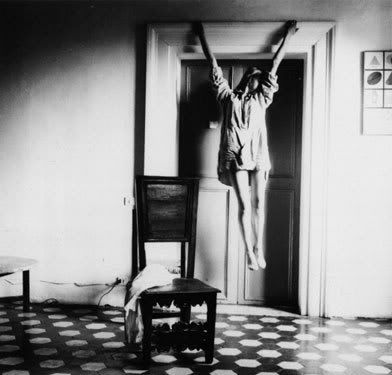
From House series, Providence, Rhode Island, 1976 by Francesca Woodman
A person, scattered in space and time, is no longer a woman but a series of events on which we can throw no light, a series of insoluble problems. - Marcel Proust, La Prisonniere (1923)
I spent the bulk of last night sifting through and reading the essays in my Phaidon-published monograph on the young visionary photographer, Francesca Woodman.
It's difficult to speak of her after ingesting so much text that strives to dissect her work and persona, but there are a few words that are thrown around enough that can describe her work: gothic, haunting, surreal, feminist. There is also a lot to be said of the story of her life in relation to her work. She grew up in an artistic family--her mother was a ceramic sculptor, her father a painter and photographer, and her brother an aspiring video-artist. She grew up between the U.S. and Italy, where her parents kept a house while they were working on university fellowships. She spent her collegiate years in Providence, Rome, and New York, where she finally ended her life at the mere age of 22.
I like how Chris Townsend compares her to Penelope, the wife of the mythical Odysseus: "always, endlessly, remaking and deconstructing her tapestries." There's a lot to say about her work. Right now, I'm interested in how she uses the female body-her own body, in space--the ideas of presence and absence, with photographic manipulation like double and long exposures. She does, in fact, always appear to be more of an apparition than a person in her photographs.

Untitled, Rome, 1977-78 by Francesca Woodman


3 comments:
haunting...i was just searchhing for francesca woodman pictures to post on my blog and i came across yours..it's lovely. thank you!
thank you, i'm glad you're here!
hmm. but wouldn't you say there is something profoundly... ridiculous about associating self-exhibition with feminism? this is a very common motive, especially in the 70s, and if we go beyond this quick association, it seems, well, dubious to say the least.
maybe it's the very idea of 'tragic liberation' that is so tainted with inefficiency it really becomes silly (although no less tragic)...
Post a Comment